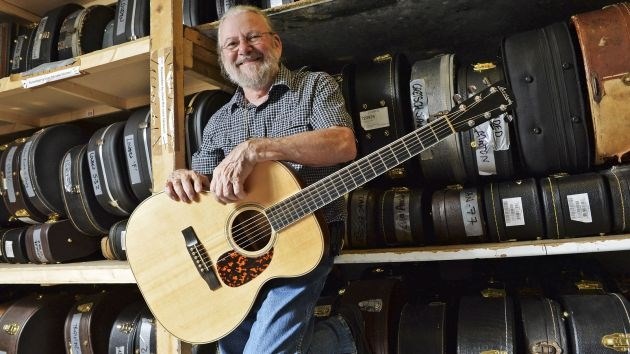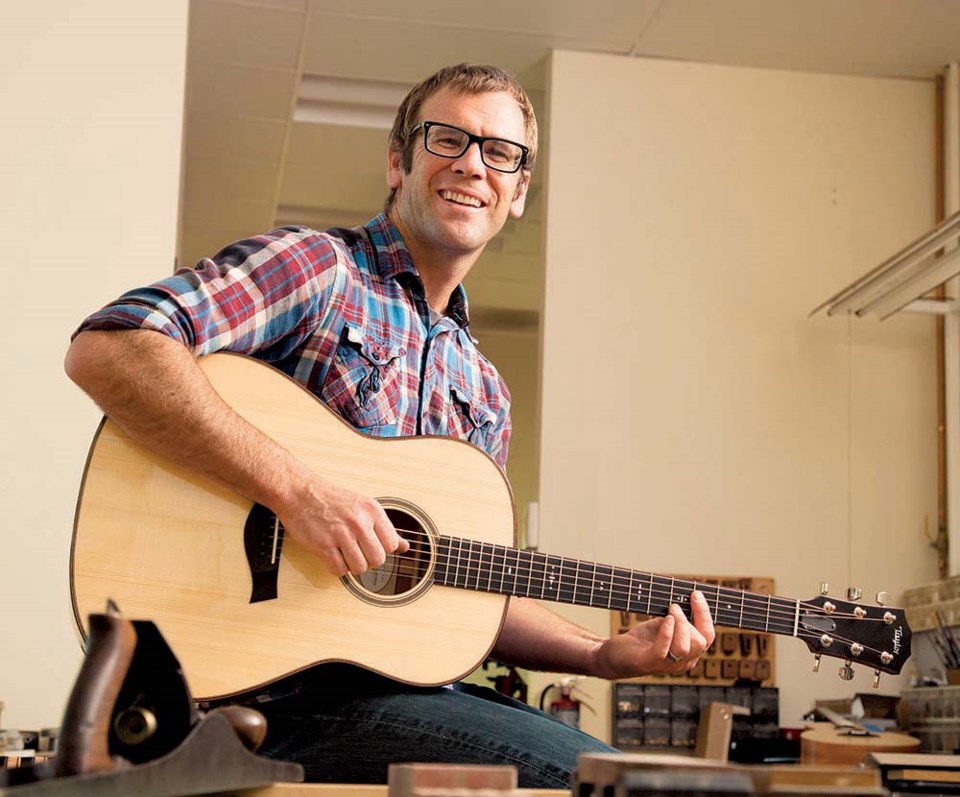From the student dorm to the stadium stage, the global popularity of the guitar is indisputable. So it’s curious that their construction remains something of an unrecognized art.
Perhaps that’s because it takes a certain type of person to build a guitar from scratch; someone like Andy Powers, who has been doing it since he was a kid.
“It isn’t so much a profession as an obsession,” says the master luthier for California-based Taylor Guitars. “We get really hooked on building these magic boxes that make sound,” he adds with a laugh.
Powers will be making a keynote speech at a luthier conference on Friday, the opening event of the weekend-long Vancouver International Guitar Festival.
Whether you thrash or pluck, rock six strings or 12 (or one neck or three), this inaugural event – the first of its kind in Western Canada – is set to resonate loudly with fretboard fanatics of all genres.
The feast of axe action at the Chinese Cultural Centre includes an exhibition featuring numerous guitars by more than 80 luthiers from across the world, all available to buy.
Many of those luthiers will be on hand to explain their creations and their craft, which could be described as a refined blend of artistic feel and engineering prowess.
“Some days you feel like a scientist or you feel like a mathematician because you’re calculating all the structural requirements. … Other times you’re just trying to mimic what you see in creation, in the outside world, into this little microcosm,” Powers says.
“It’s this real holistic approach, where you’re bringing everything you can think of to the table and building the best instrument you can.”
There are standard shapes in the guitar world — think of the classic figure-of-eight acoustic — but within those parameters are what Powers calls an “infinite number of possibilities for the curves that connect those measurements. And within that subtlety is where makers start to contribute their own unique signature.”
Many luthiers are stretching those traditional shapes into ever more artistic forms, while maintaining their desired sound. Some have even used space-age materials such as graphene, but always alongside traditional materials that have served luthiers well for centuries.
The latter include the wood of coniferous trees such as spruce, cedar and redwood that have long comprised the tops of guitar bodies.

It was access to such raw materials — specifically Sitka spruce — that drew pioneering Canadian luthier Jean Larrivée from Toronto to BC in the late 1970s. Over the years, his business moved from Victora to North Vancouver and then Vancouver as the renown of Larrivée Guitars spread.
Despite closing his Vancouver plant in 2013, Larrivée maintains a successful base in California, where he now lives.
He may be 73, but age hasn’t slowed down his hunt for the right materials. He still goes out on the road for four months of the year to source the right wood – whether it’s Canadian maple, Indian rosewood or Austrian spruce.
After 50 years in the business, Larrivée knows when something sounds right.
“I know what I like. When somebody strums a guitar — I don’t even have to play the guitar — I know certain woods that make those sounds. It’s one of the reasons I travel so much. … I work like an idiot,” he says with a wry chuckle.
Larrivée’s evident dedication to the craft – as well his company’s golden anniversary and his role in establishing the craft of guitar making in Canada as part of the “Group of Seven” luthiers – will see him honoured with the 2017 Luthier Industry Builder Award at Friday’s conference.
Echoing Powers’ feelings about the draw of the craft, Larrivée says he has no regrets about his decades of building guitars.
“Guitar making is kind of a drug, an addiction … you make one guitar it sounds like this, you make another guitar it sounds like that. It’s a continuous process,” he says.
The exhibition on Saturday and Sunday will be punctuated by live demos featuring talents such as Itamar Erez, Hayley McLean, David Martone and Paul Pigat.
There’s also a range of workshops over the weekend, spanning topics from finger-style tips to guitar repair and social media marketing.
The Vancouver International Guitar Festival exhibition runs Saturday (10am-6pm) and Sunday (10am-5pm); two-day pass $30/$21 students, one day $20/$14 students; workshops $25 each (some are free). See vancouverguitarfestival.com for more details.


